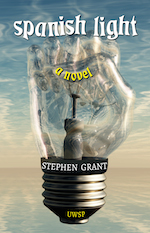(March 10, 2018)
"... in a world bereft of meaning ... there's the need to make a difference ..."
—KIRKUS REVIEWS
"... an ingenious and gripping hi-jinks finance and legal thriller pulled straight from the headlines of the global economic meltdown. "
—JOSEPH G. PETERSON
"Read Stephen Grant's short story "Luminosity" – an adaption of
this novel's first chapter.
Available as an eBook at Smashwords, Amazon, Barnes and Noble, Kobo, Apple, Blio and other fine eBook retailers.
ISBN 978-1-935830-50-4 (Softcover)
ISBN 978-1-935830-54-2 (eBook)
Intrigue, romance, reversals of fortune, and the question of the good life are at the heart of Spanish Light, Stephen Grant's enthralling new novel about the 2008 global economic crisis and its aftermath. Set in England and Spain, it is the extraordinary tale of a renegade London banker whose quest for personal redemption takes an unexpected turn when he falls for a Spanish philosopher-activist and finds himself embroiled in an ostensibly unwinnable battle against a corrupt government.
REVIEWS
"A tale of ... love among the financial ruins [and] the need to make a difference ... Grant laces his narrative with big issues—the rights of workers and refugees, workaday ethics, avarice and redistribution ..."
ISBN 978-1-935830-50-4 (Softcover)
ISBN 978-1-935830-54-2 (eBook)
Publication Date: March 10, 2018
ABOUT THE AUTHOR
Stephen Grant is a London-based novelist, educator, and trade unionist. He is the author of one previous book, the award-winning campus novel A Moment More Sublime, which cost him his job as lecturer of philosophy at Richmond upon Thames College and was short-listed for The Guardian’s Not the Booker Prize in 2015.
SPANISH LIGHT — Stephen Grant in Conversation
UWSP: What inspired you to write Spanish Light?
SG: There were two key factors which motivated the book. The first was a fascination with how an entire industry could simply fail to understand what was happening within its own world and failed to foresee the 2008 economic meltdown. It is clear that large numbers of highly educated and experienced people had little or no idea what they were buying and selling. I also wished to explore the impact of the global financial crisis on ordinary people, none of whom could conceivably be held responsible for it, but who must now pay for it. The novel aims to explore these issues in ways which reflect the absurdity and the seriousness of this disaster, and to do so in a way which avoids sinking into stereotypes of evil bankers deliberately fleecing those around them.
UWSP: What, would you say, is the main or most important thought or insight of Spanish Light?
SG: The book deals with a range of fundamental issues such as justice, inequality, and the challenges of marriage and parenthood. Perhaps the most pressing insight is the role of morality in the pursuit of happiness. The book portrays characters who are trying to do the right thing, and however difficult, this is presented as a requirement for any possibility of leading a happy life.
UWSP: Spanish Light both keeps its readers at the edge of their seats and allows them to engage in deep philosophical reflection about life, love, friendship, greed, loyalty, betrayal, and luck. How did you go about interweaving the philosophical and the narrative so as to achieve your novel’s singular level of “thoughtful suspense”?
SG: The suspense and the intellectual content of the book are both a reflection of the subject matter. The reason why so many of us are gripped by issues such as the Trump presidency and the Brexit vote, is partly because such phenomena force us to confront fundamental questions about the kind of world we want to live in. Division vs. unity. Tolerance vs. repression. Nationalism vs. cosmopolitanism. The financial crisis and its impact on communities across the world is similar because we must face similarly important questions about who has power, how much free markets should be allowed to control our lives, and the issue of social justice. These issues also lend themselves to the creation of suspense because there is so much genuine mystery involved. How could such a crisis actually occur? Why is it that someone can be sent to prison for over-claiming on welfare, whilst no one is behind bars for causing the worst crisis in almost a century? The characters in Spanish Light are caught up in a world which has to answer these questions whether it wants to or not.
UWSP: What readership do you have ideally in mind for your novel? And how would you describe your novel’s differences in appeal for readers across the age spectrum?
SG: I hope that the book will hold its own largely due to the characterization of the central figures. They are complex, intelligent, but also struggling in very different ways to find their feet in the world after the crisis. The challenges they must confront should resonate with anyone who has found themselves worried about what kind of world we are turning into, and about the moral issues we must confront as a result of this.
In terms of the appeal the book may have for different age groups, I suspect that readers who recall the crisis will be curious to read a fictional account of it because it was such an extraordinary moment. I also think that the book will appeal to younger readers due to the explicit attempt to deal with issues of justice and how one’s personal life is affected by wider political developments. One of the remarkable features of the 2017 British election was a surge in turnout from younger voters who were determined to support what they felt were the more principled policies they saw on offer from the Labour Party. This book reflects that sort of hope and should appeal to anyone who shares it.
UWSP: Do you have any favorite novelists, and if so, did you have any particular contemporaries of precursors at the back of you mind as you were writing Spanish Light?
SG: The authors I tend to read are contemporary American ones. The book which has had the greatest impact on my own writing over recent years was Philipp Meyer’s extraordinary work The Son. It is the ability to take epic history and use it as a source for compelling characters in a fictional setting which I strive for. In terms of writers who had a greater specific impact on the content of Spanish Light, then, I would single out non-fiction, and I would urge anyone with an interest in the events of 2008 to put aside any thriller and read Whoops by John Lanchester, which is much more exciting. I also hope that my novel is punctuated with passages which readers will find genuinely amusing, and I would single out Gary Shteyngart as someone I admire for producing novels with serious themes, but that are also laugh-out-loud funny.
UWSP: Whom would you pick to play the protagonists if Spanish Light were to be turned into a movie, and why?
SG: Casting the film should be a piece of cake. Mat would have to be played by either Benedict Cumberbatch, or Michael Fassbender doing his immaculate British accent. Miriam should be Penelope Cruz, although you could also get away with one of the leading French actresses doing a Spanish accent, perhaps Marion Cottillard or Lea Seydoux.
© 2017 Upper West Side Philosophers, Inc.

- All Titles A-Z
- 17 Vorurteile, die wir Deutschen ...
- A Moment More Sublime: A Novel
- Become a Message: Poems
- Below Zero: A Play
- Channel Swimmer: A Novel
- Descartes’ Devil: Three Meditations
- Fatal Numbers: Why Count on Chance
- Gespräch über Deutschland. Mit zwei Essays
- Health Is in Your Hands: Jin Shin Jyutsu — Practicing the Art of Self-Healing (with 51 Flash Cards for the Hands-on Practice of Jin Shin Jyutsu)
- High on Low: Harnessing the Power of Unhappiness
- Homo Conscius: A Novel
- In Praise of Weakness
- Mortal Diamond: Poems
- November Rose: A Speech on Death
- November-Rose: Eine Rede über den Tod
- Of Parents and Children
- On Dialogic Speech
- On Language & Poetry
- Összes Versei
- Passing Time: An Essay on Waiting
- Philosophical Fragments of a Contemporary Life
- Philosophical Truffles
- Spanish Light
- The Complete Plays of Lajos Walder
- The Complete Poems of Lajos Walder
- The DNA of Prejudice: On the One and the Many
- The Impostors: A Novel
- The Man Who Couldn't Stop Thinking: A Novel
- The Spectator: A Novel
- The Square Light of the Moon
- The Vocation of Poetry
- The Wisdom of Parenthood: An Essay
- The Zucchini Conspiracy: A Novel of Alternative Facts
- Tyrtaeus: A Tragedy
- Vase of Pompeii: A Play
- What We Gain As We Grow Older: On Gelassenheit
- Yoga for the Mind: A New Ethic for Thinking and Being & Meridians of Thought























